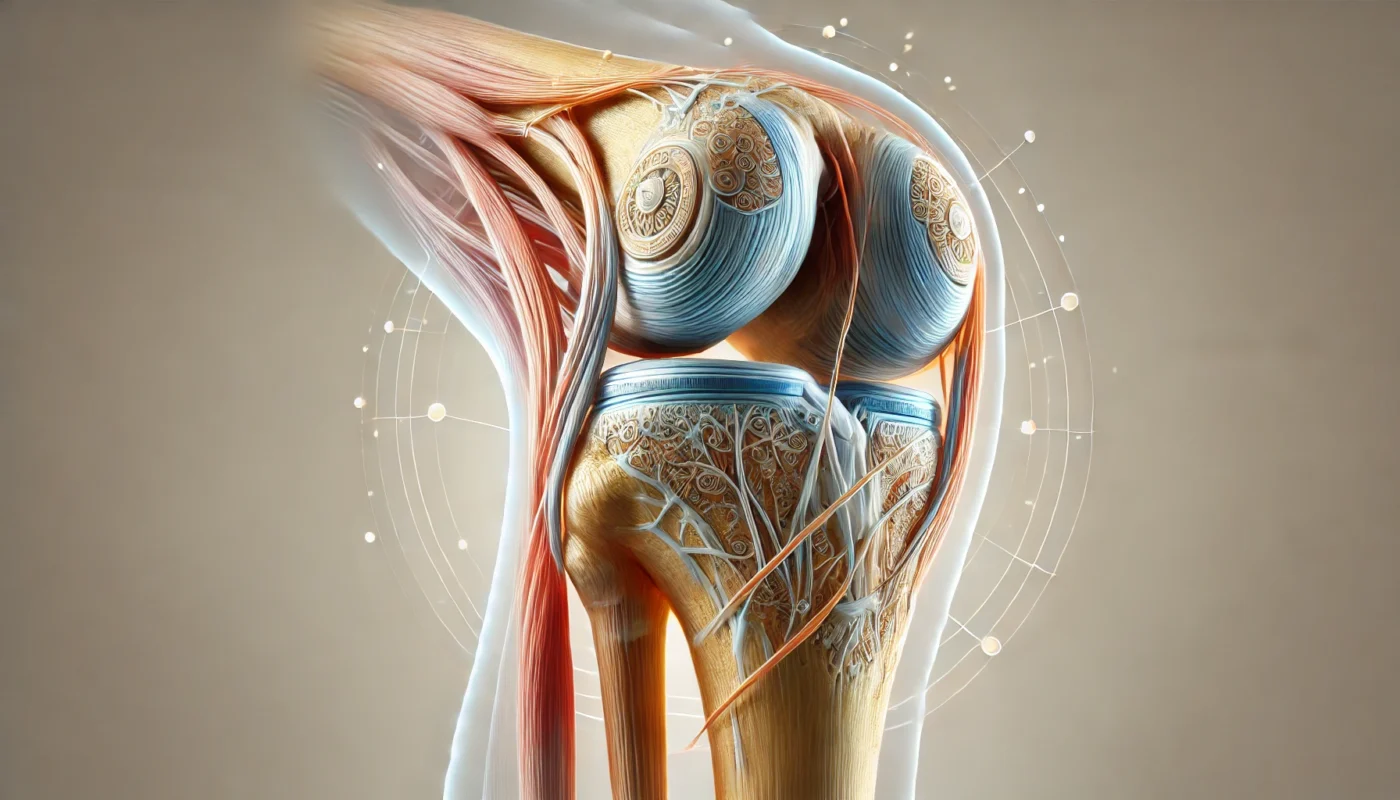Joints are the connections between bones that allow for movement and provide mechanical support. Ligaments are the fibrous connective tissues that link bones together at the joints. Both are pivotal in maintaining physical functionality. When joints are not healthy, it leads to discomfort, pain, and even debilitating conditions such as arthritis.
Anatomy of Joints and Ligaments
Joints are complex structures that enable mobility and bear our body weight. They consist of cartilage, synovial membranes, and ligaments, each playing a specific role. Cartilage cushions the bones, synovial fluid lubricates, and ligaments stabilize. Understanding this anatomy is key to appreciating how nutrition can influence joint health.
Common Joint Issues
Several issues can affect joints, including osteoarthritis, rheumatoid arthritis, and ligament injuries. These conditions can arise from aging, repetitive stress, or autoimmune diseases. Recognizing symptoms early, such as stiffness, swelling, or pain, can help in addressing these issues promptly.
The Impact of Lifestyle on Joint Health
Lifestyle factors such as physical activity, body weight, and diet directly impact joint health. Excess weight can strain joints, while a sedentary lifestyle can lead to stiffness and weakness. Conversely, a balanced diet and regular exercise can enhance joint resilience and flexibility.
You May Also Like: Managing Pain Through Dietary Choices
The Role of Nutrition in Joint Health
Nutrition plays a significant role in maintaining and improving joint health. A diet rich in certain nutrients can help reduce inflammation, promote cartilage repair, and enhance overall joint and ligament strength. Let’s explore these nutrients and how they contribute to healthier joints.
How Nutrients Affect Joint Health
Nutrients influence the body’s inflammatory response, cartilage repair mechanisms, and overall joint integrity. Certain nutrients act as building blocks for cartilage, while others help reduce oxidative stress and inflammation. Understanding these roles can aid in crafting a diet that supports joint health.
The Science Behind Nutrition and Joints
Research has shown that specific nutrients can alter the course of joint degeneration. Studies suggest that diets rich in anti-inflammatory and cartilage-supporting nutrients can slow down the progression of joint-related diseases. This scientific backing emphasizes the importance of nutrition in joint care.
Personalized Nutrition for Joint Health
Each individual’s nutritional needs may vary based on factors such as age, activity level, and existing health conditions. Consulting with healthcare providers to tailor a diet plan that meets specific needs can optimize joint health outcomes.

Key Nutrients for Joint Health
Omega-3 Fatty Acids
Omega-3 fatty acids are renowned for their anti-inflammatory properties. Found abundantly in fatty fish such as salmon, mackerel, and sardines, omega-3s help reduce joint inflammation and stiffness. They may also slow down the progression of arthritis by inhibiting inflammatory enzymes.
Health Benefits Beyond Joints
Omega-3s are not only beneficial for joints but also support heart health, cognitive function, and mood regulation. Their anti-inflammatory properties extend their benefits to overall wellness, making them a valuable nutrient in any diet.
Incorporating Omega-3s into Meals
Incorporating omega-3s into meals can be delicious and straightforward. Enjoy grilled salmon, add chia seeds to smoothies, or sprinkle flaxseeds on yogurt. These small dietary changes can enhance your omega-3 intake significantly.
Supplements: An Alternative Source
For those who find it challenging to get enough omega-3s from food, high-quality fish oil or algae-based supplements can be an effective alternative. Always choose reputable brands and consult with a healthcare provider before starting supplements.
Vitamin D
Vitamin D is essential for bone health and plays a role in calcium absorption. A deficiency in vitamin D can lead to weakened bones and joints. Ensuring adequate levels of vitamin D helps in maintaining strong bones and supporting joint function.
The Sunshine Vitamin
Vitamin D is often called the “sunshine vitamin” because our bodies produce it in response to sunlight. However, factors such as geographic location and skin exposure can affect synthesis. Understanding this can help in addressing potential deficiencies.
Dietary Sources of Vitamin D
While sunlight is the best source, foods like fortified milk, fatty fish, and egg yolks can help maintain adequate vitamin D levels. Incorporating these foods into your diet can complement sunlight exposure, especially during winter months.
Vitamin D Supplementation
In cases of deficiency, supplementation may be necessary. Vitamin D supplements come in various forms, and a healthcare provider can recommend the appropriate dosage based on individual needs.
Collagen
Collagen is the most abundant protein in the body and a major component of connective tissues. It helps maintain the integrity of cartilage, which is crucial for joint health. Supplementing with collagen or consuming collagen-rich foods can support joint flexibility and reduce joint pain.
The Role of Collagen in Joint Repair
Collagen supports cartilage regeneration and reduces joint pain. It acts as a cushion between bones, preventing friction and wear. Understanding its role can highlight its importance in joint health maintenance.
Natural Sources of Collagen
Bone broth, chicken skin, and gelatin are rich sources of collagen. Incorporating these into soups or stews can enhance collagen intake naturally. These foods not only support joints but also contribute to skin and hair health.
Collagen Supplements: What to Know
Collagen supplements are available in various forms, such as powders and capsules. They can be an effective way to ensure adequate collagen intake, especially for those who may not consume enough through diet.
Antioxidants
Antioxidants combat oxidative stress, which can damage cells and exacerbate inflammation. Consuming foods rich in antioxidants helps protect joints by reducing inflammation and promoting healing.
The Power of Antioxidants
Antioxidants neutralize free radicals, preventing cellular damage. This process is crucial in reducing inflammation and supporting joint health. Understanding this mechanism can underscore the importance of a diet rich in antioxidants.
Foods Rich in Antioxidants
Berries, leafy greens, nuts, and seeds are excellent sources of antioxidants. Incorporating these into daily meals can provide a wide range of health benefits, including joint protection.
Antioxidants and Aging
As we age, oxidative stress can increase, leading to joint degeneration. A diet high in antioxidants can slow this process, supporting healthier aging and maintaining joint function.
Glucosamine and Chondroitin
Glucosamine and chondroitin are compounds found naturally in cartilage. They are often used in supplements to reduce joint pain and improve joint function. These compounds support the repair and maintenance of cartilage, helping to keep joints lubricated and healthy.
Understanding Their Mechanisms
Glucosamine and chondroitin contribute to cartilage synthesis and repair. They help maintain elasticity and hydration, essential for joint movement. Knowledge of these mechanisms can inform decisions about their use in supplements.
Food and Supplement Sources
While natural sources are limited, supplements derived from shellfish or synthetic processes are widely available. These can be a practical option for those looking to enhance joint health through supplementation.
Choosing the Right Supplement
Not all supplements are created equal. Researching brands and consulting with healthcare providers can ensure you’re choosing effective glucosamine and chondroitin supplements.
Turmeric
Turmeric contains curcumin, a potent anti-inflammatory compound. Curcumin has been shown to reduce joint pain and improve mobility in individuals with arthritis. Incorporating turmeric into your diet can provide natural support for joint health.
The Benefits of Curcumin
Curcumin’s anti-inflammatory effects extend beyond joint health, benefiting overall wellness. It can enhance digestion, support immune function, and improve cardiovascular health. These benefits make turmeric a valuable addition to any diet.
Culinary Uses of Turmeric
Turmeric is versatile in cooking. It can be added to curries, soups, or smoothies for a flavorful and healthful boost. Experimenting with recipes can make incorporating turmeric enjoyable and beneficial.
Curcumin Supplements: An Option
For those who prefer not to cook with turmeric, curcumin supplements offer a concentrated form. As with any supplement, it’s essential to choose high-quality products and consult with a healthcare provider.

Practical Tips for Incorporating Joint-Healthy Foods
Meal Planning
Incorporate joint-supporting foods into your meal plan by focusing on a balanced diet rich in fruits, vegetables, lean proteins, and healthy fats. Prioritize foods that are naturally high in omega-3s, antioxidants, and other joint-beneficial nutrients.
Creating a Weekly Menu
Planning a weekly menu can simplify incorporating joint-healthy foods. Designate certain meals for fish, include leafy greens in salads, and use nuts as snacks. This approach ensures a balanced intake of essential nutrients.
Shopping Tips for Joint Health
When grocery shopping, focus on fresh, whole foods. Choose wild-caught fish, organic produce, and high-quality supplements. These choices can maximize the nutritional value of your meals.
Batch Cooking for Convenience
Preparing meals in advance can make sticking to a joint-healthy diet easier. Cook large batches of soups or stews with bone broth and freeze portions for later use. This strategy saves time and ensures nutritious meals are always available.
Experiment with Recipes
Try adding turmeric to soups, stews, and curries for an anti-inflammatory boost. Use bone broth as a base for soups or as a cooking liquid for grains to increase collagen intake.
Exploring Global Cuisines
Global cuisines offer a variety of recipes rich in joint-supporting nutrients. Explore Mediterranean, Asian, or Indian dishes, which often incorporate fish, turmeric, and leafy greens. This exploration can make healthy eating exciting and diverse.
Creative Cooking Techniques
Experiment with different cooking techniques to enhance nutrient retention. Steaming vegetables, grilling fish, and slow-cooking broths can preserve nutrients better than frying or overcooking.
Incorporating Superfoods
Superfoods like chia seeds, flaxseeds, and berries can easily be added to everyday meals. Sprinkle them on cereals, blend them into smoothies, or use them in baking for an antioxidant and omega-3 boost.
Consider Supplements
If dietary sources are insufficient, consider high-quality supplements of omega-3s, glucosamine, chondroitin, and collagen to support joint health. Always consult with a healthcare professional before starting any supplement regimen.
Evaluating Supplement Needs
Assessing dietary intake and health goals can help determine if supplements are necessary. A healthcare provider can offer guidance, ensuring supplements complement rather than replace a healthy diet.
Navigating the Supplement Market
The supplement market is vast, with varying quality standards. Look for third-party tested products and those with clear ingredient lists. Researching brands and seeking professional advice can ensure safe choices.
Combining Supplements with Diet
Supplements should enhance, not substitute, a nutritious diet. Combine them with whole foods rich in joint-supporting nutrients for a comprehensive approach to joint health.

Conclusion: Nourishing Your Joints for Lifelong Health
Healthy joints and ligaments are foundational to an active and fulfilling lifestyle. By integrating these essential nutrients into your diet, you can support joint health naturally and effectively. Whether through food or supplements, focusing on joint-nourishing nutrients can help alleviate pain, enhance mobility, and improve overall quality of life.
Embracing a Joint-Healthy Lifestyle
Making dietary changes is a significant step towards joint health, but it should be part of a holistic approach. Incorporate regular exercise, maintain a healthy weight, and avoid smoking to further support joint functionality.
The Long-Term Benefits of Nutrition
Nutritional strategies for joint health offer long-term benefits, potentially reducing the risk of chronic joint conditions and improving quality of life. Consistent dietary choices can lead to sustained improvements in joint comfort and mobility.
A Proactive Approach to Joint Care
By understanding and applying these nutritional insights, you can take proactive steps towards maintaining robust joint health and living a vibrant, active life. Early intervention and ongoing care can prevent or mitigate joint issues, ensuring greater freedom of movement and less pain.
Further Reading:
What to eat for healthy joints
6 Foods To Eat for Healthy Joints
Eat to Strengthen Your Bones, Ligaments, Cartilage, & Muscles
Turmeric, Curcumin, Joint Health, Nutrition, Anti-Inflammatory, Meal Planning, Superfoods, Omega-3, Healthy Eating, Supplements, Bone Broth, Global Cuisines, Healthy Fats, Antioxidants, Dietary Tips, Holistic Health, Chronic Conditions, Mobility, Exercise, Wellness
Important Note: The information contained in this article is for general informational purposes only, and should not be construed as health or medical advice, nor is it intended to diagnose, prevent, treat, or cure any disease or health condition. Before embarking on any diet, fitness regimen, or program of nutritional supplementation, it is advisable to consult your healthcare professional in order to determine its safety and probable efficacy in terms of your individual state of health.
Regarding Nutritional Supplements Or Other Non-Prescription Health Products: If any nutritional supplements or other non-prescription health products are mentioned in the foregoing article, any claims or statements made about them have not been evaluated by the U.S. Food and Drug Administration, and such nutritional supplements or other health products are not intended to diagnose, treat, cure, or prevent any disease.

